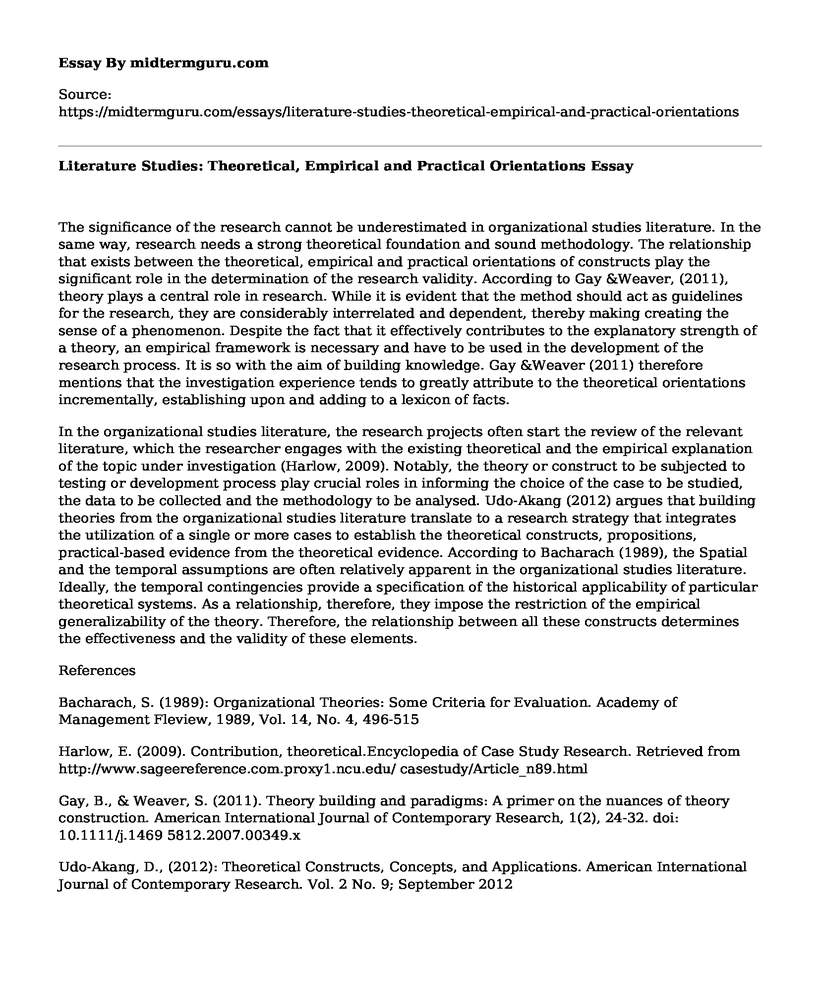The significance of the research cannot be underestimated in organizational studies literature. In the same way, research needs a strong theoretical foundation and sound methodology. The relationship that exists between the theoretical, empirical and practical orientations of constructs play the significant role in the determination of the research validity. According to Gay &Weaver, (2011), theory plays a central role in research. While it is evident that the method should act as guidelines for the research, they are considerably interrelated and dependent, thereby making creating the sense of a phenomenon. Despite the fact that it effectively contributes to the explanatory strength of a theory, an empirical framework is necessary and have to be used in the development of the research process. It is so with the aim of building knowledge. Gay &Weaver (2011) therefore mentions that the investigation experience tends to greatly attribute to the theoretical orientations incrementally, establishing upon and adding to a lexicon of facts.
In the organizational studies literature, the research projects often start the review of the relevant literature, which the researcher engages with the existing theoretical and the empirical explanation of the topic under investigation (Harlow, 2009). Notably, the theory or construct to be subjected to testing or development process play crucial roles in informing the choice of the case to be studied, the data to be collected and the methodology to be analysed. Udo-Akang (2012) argues that building theories from the organizational studies literature translate to a research strategy that integrates the utilization of a single or more cases to establish the theoretical constructs, propositions, practical-based evidence from the theoretical evidence. According to Bacharach (1989), the Spatial and the temporal assumptions are often relatively apparent in the organizational studies literature. Ideally, the temporal contingencies provide a specification of the historical applicability of particular theoretical systems. As a relationship, therefore, they impose the restriction of the empirical generalizability of the theory. Therefore, the relationship between all these constructs determines the effectiveness and the validity of these elements.
References
Bacharach, S. (1989): Organizational Theories: Some Criteria for Evaluation. Academy of Management Fleview, 1989, Vol. 14, No. 4, 496-515
Harlow, E. (2009). Contribution, theoretical.Encyclopedia of Case Study Research. Retrieved from http://www.sageereference.com.proxy1.ncu.edu/ casestudy/Article_n89.html
Gay, B., & Weaver, S. (2011). Theory building and paradigms: A primer on the nuances of theory construction. American International Journal of Contemporary Research, 1(2), 24-32. doi: 10.1111/j.1469 5812.2007.00349.x
Udo-Akang, D., (2012): Theoretical Constructs, Concepts, and Applications. American International Journal of Contemporary Research. Vol. 2 No. 9; September 2012
Cite this page
Literature Studies: Theoretical, Empirical and Practical Orientations. (2021, May 27). Retrieved from https://midtermguru.com/essays/literature-studies-theoretical-empirical-and-practical-orientations
If you are the original author of this essay and no longer wish to have it published on the midtermguru.com website, please click below to request its removal:
- Example of a Paper on Statistical Techniques
- Paper Sample With Questions on Statistics: P-Value and Statistical Hypothesis
- Qualitative Research on Reflective Practice in Nursing Critique
- Statistics in Business - Paper Example
- Article Analysis Paper Example With a Plan
- Research Protocol: Design, Plan, & Ethically Approve - Research Paper
- A Comprehensive Guide to Literature Reviews: Qualitative vs Quantitative - Essay Sample







